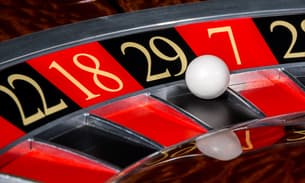
Analysis: The finance lobby faces its biggest challenge
In the thick of it. George Osborne in Canary Wharf.
There is almost unanimous agreement in Europe that bankers’ bonuses need to be curbed. As things stand, bonuses can reach up to 10 times a trader’s salary. So a banker earning £1m today could be rewarded with an extra £10m.
Part of Brussels response to the financial crisis is a well advanced proposal to peg the ratio between bankers’ bonuses and salaries to a maximum of 1:1.
But the 1:1 measure is strongly opposed in the City. A steady stream of bank chief executives, reportedly led by Standard Chartered chief executive Peter Sands, have voiced their concerns about this directly with David Cameron.
Bank bosses argue a European clampdown on bonuses will drive up basic salaries and spark an exodus of ‘talent’ from London to Geneva, New York or Hong Kong. Their blandishments are said to have convinced George Osborne who is reportedly against the reform.
In the wake of the LIBOR scandal and the deepening economic crisis, it seems the government is siding with the City of London. Behind the scenes, it appears the banking lobby is bending the ear of Whitehall.
Powerful force
In a democratic society, every interest group has a right to make their views known. And that’s how it should be. There is nothing wrong with lobbying.
But in the UK, it is widely thought that banks, private equity tycoons and hedge funds wield disproportionate power within the political process. Many argue they effectively run Britain.
Until now, nobody has defined the scale of its lobbying firepower. In the UK, there are no official registries that disclose the number of public affairs staff who work for banks, hedge funds, private equity firms, insurance companies, industry bodies or law firms. And there are currently no plans for them to be included in forthcoming government transparency legislation designed to increase openness.
Related article: Revealed – The £93m City lobby machine
Many public affairs consultancies disclose their financial-sector clients on the Association of Professional Political Consultants register. But no details exist on how much they are paid, and for what work.
This is where the Bureau’s research has broken new ground. By directly approaching and verifying organisations linked to the financial services lobbying machine, we can be confident that Britain’s financial services industry spent in excess of £92.8m engaging with the political process in 2011. And that over 800 individuals lobby Whitehall and regulators.
But that is only half the story. Cabinet ministers have confided to us that they have never experienced anything like the financial sector’s public affairs arsenal.
‘Off the scale’, was how one minister described it.
Through informal one-to-one meetings, little known committees, well-funded policy reports and lavish entertainment, the finance lobby is supremely efficient at accessing Whitehall and parliament.
Related article: Streets paved with gold – The local authority working for the banks
Our work has quantified how this is done. We have worked out the number of Lords who are directly paid by banks and other financial institutions – and revealed that a majority of the Lords who scrutinised the small print on last year’s crucial Budget were paid by the finance sector.
We have discovered how regulators worked in tandem with industry representatives in order to lobby against measures that would have limited speculation in commodity markets.
The Square Mile’s influence
Many believe the financial sector’s takeover of the UK began with the Big Bang in 1986. Others contend that the seeds of this change pre-date this by a generation.
Nicholas Shaxson claims in his book Treasure Islands, that a watershed moment took place in the 1950s, when the Bank of England attempted to plug a gap in Britain’s raison d’etre by facilitating an unregulated, offshore international foreign exchange market. This, according to Shaxson, was the moment the City became the tail that wagged the British bulldog. It has not stopped wagging since.
The 1986 Big Bang saw the dismantling of barriers between stockbrokers, corporate advisers and market makers. It produced another ‘triumphant’ policy outcome for the City. It was, to some degree, the encapsulation of Margaret Thatcher’s determination to shift the UK to a serviced-based, liberalised economy.
The City reform saw US finance giants swarm to London. They found the City liberating compared with the restrictions they then faced on Wall Street. It would take them another 14 years to dismantle such regulations on their home turf.
Related article: Insurance industry weakens pension scheme for low paid
Golden age of finance
Tony Blair and Gordon Brown, in awe of financiers, infamously recast the UK financial regulatory environment as ‘light touch’ to allow a ‘golden age’ of so-called financial creativity to thrive.
A turbo-charged, deal-driven culture propelled the City as the rainmaker of British politics. It has in recent days emerged that Brown sold Britain’s gold reserves at what turned out to be a massive loss to the nation to shore up the banking system. This was reportedly done at the request of Goldman Sachs. Such was the power of the banking lobby.
Osborne’s decision to side with the City against bonus clampdowns and the financial transaction tax underlines the suspicion that the finance lobby’s power remains undiminished.
The chancellor, like many, is convinced that the UK will be lost without its finance cluster.
It is true that it contributes around 8% of GDP. But this is still only two-thirds the size of the manufacturing sector. And the financial sector has also been responsible for the economic volatility we are all living through.
It has got to the point that much of Europe is no longer prepared to tolerate Britain defending its financial services.
High water mark
Since the banking crisis of 2008 and the subsequent sovereign debt crisis, a new mood among European policymakers has emerged.
Paris and Berlin appear determined to reassert control over the European banking sector at the expense of the City, which they blame – rightly or wrongly – for many of its ills.
And in Ed Miliband, the City has no ally. The smoke signals from Labour finance apparatchiks suggest an aggressively reformist agenda to recast ‘predatory finance’ as a servant of the economy rather than its master. The move also marks an attempt to create distance from New Labour’s infatuation with money men.
So between France, Germany, Brussels and the Labour party, the finance lobby will find the next five years to be its most severe challenge for a generation.
But as it enters a defining period, one thing is certain: it won’t suffer from a lack of resource, personnel or money.




